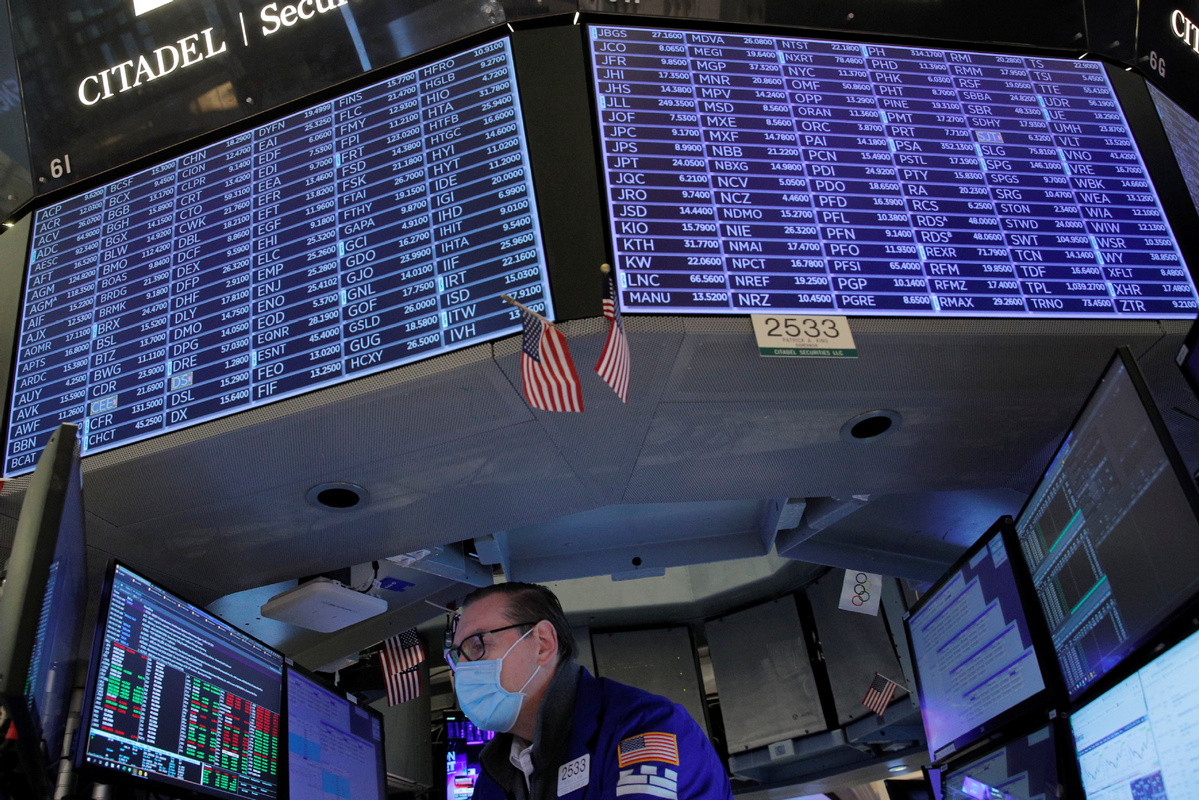Push to ban Congress' stock trading gains momentum
By YIFAN XU in Washington | chinadaily.com.cn | Updated: 2022-01-26 10:47

Twenty-seven House members — 25 Democrats and two Republicans — signed an open letter on Monday calling for swiftly bringing forward a bill to ban members of Congress in office from owning or trading stocks.
The letter was drafted by Representative Jared Golden, a Maine Democrat, and addressed to House Speaker Nancy Pelosi, a California Democrat, and House Minority Leader Kevin McCarthy, Republican of California.
Craig Holman, a lobbyist at the government watchdog group, Public Citizen, said that bipartisan momentum behind legislation prohibiting Congress from trading stocks is growing.
"Democrats and Republicans alike have found themselves in politically hot water for even the appearances of congressional insider trading, so many lawmakers are prepared simply to ban such stock trading altogether for Congress," Holman told China Daily.
Currently, Congress members buy or sell stocks under the Stop Trading on Congressional Knowledge (STOCK) Act, overwhelmingly passed with bipartisan support by Congress in 2012 and amended in 2013, which outlawed insider trading. The STOCK Act mandated high-ranking officials, including members and employees of Congress, file detailed financial disclosures.
"The STOCK Act finally made it illegal for lawmakers to use that inside information, but still allowed them to actively play in the market. …The pandemic brought home the point that many members appear to be doing insider trading. Following confidential briefings on the likely impact of the pandemic on the economy," said Holman.
He said that Senators Richard Burr, a North Carolina Republican, dumped all his stock in a single day immediately after the briefing; former senators Kelly Loeffler and David Perdue, both Georgia Republicans, sold many of their stocks just before a crash in the market when they were in office.
California Democratic Senator Dianne Feinstein was among the lawmakers who earned higher-than-average returns on stock investments.
Serkan Karadas, an assistant professor at the University of Illinois-Springfield, highlighted the pattern in a paper published a few years ago, according to San Jose Inside.
"One recent investigation found that the STOCK Act had been violated hundreds of times just since 2020. It's clear the current rules are not working," reads the letter. The calling across the aisle is trying to bring legislation "such as the Ban Conflicted Trading Act or the TRUST in Congress Act, to the House floor".
After a five-month investigation, Business Insider and other media identified 54 members of Congress — 32 Republicans and 22 Democrats — and 182 congressional staffers in the current Congress who allegedly violated the provisions of the STOCK Act by not reporting their stock-trading records in a timely fashion. They blamed oversights, clerical errors and inattentive accountants, among other reasons.
The penalties for lawmakers who violate the STOCK Act are minor — usually a $200 fine, which sometimes is waived by House or Senate ethics officials.
"Members of Congress and senior congressional staff are privy to confidential briefings and inside information about likely trends in the economy that no one else has," Holman said. "This access to confidential material information opens the window of opportunity for insider trading, and many lawmakers appear to be doing exactly that."
The open letter also said: "Perhaps this means some of our colleagues will miss out on lucrative investment opportunities; we don't care. We came to Congress to serve our country, not turn a quick buck."
Both the Conflict Trading Prohibition Act and the Congressional TRUST Act mentioned in the letter have bipartisan support. The acts require lawmakers, their spouses and dependent children to hold their current investments or place those assets in a blind trust to prevent them from trading in stocks when in office.
"All investments should be put into blind trusts for members and senior staff. Members should not trade stock," James Thurber, a professor at American University and a congressional ethics expert, told China Daily. He also noted that "the issue of inside trading has the potential to blow up in the 2022 election".
"It is an equal threat to both parties," he said.
The supporters of banning members of Congress and their families from trading stocks see the limits as protecting democracy, people's trust in the US government, and ethics.
Some others, also from both parties, have mixed or unfavorable views on the legislation. One concern is that the ban might prevent lawmakers to prepare for their retirement when holding public office, thus reducing the attractiveness of qualified people running for Congress.
In December, Pelosi said that members of Congress should not be barred from trading stock because: "We are a free-market economy. They should be able to participate in that."
However, Pelosi, at a weekly press conference on Jan 20, said that she was open to a ban on congressional stock trading.
Her husband, Paul Pelosi, was revealed to have traded large blocks of stocks and options in recent years, many of big companies that the speaker is involved with on regulatory issues.
On Jan 18, when asked about President Joe Biden's position on this issue, White House press secretary Jen Psaki said he "believes that everyone should be held to the highest standard". She said he favored letting "members of leadership in Congress and members of Congress determine what the rules should be".
Psaki said that Biden did not trade stocks from 1978 to 2009 when he was a US senator.
According to a recent survey released Jan 20 by conservative advocacy group Convention of States Action, 76 percent of voters believe that lawmakers and their spouses have an "unfair advantage" in the stock market.
Last November, another poll commissioned by the Campaign Legal Center showed that 67 percent of voters support banning lawmakers from owning or trading stocks.
























